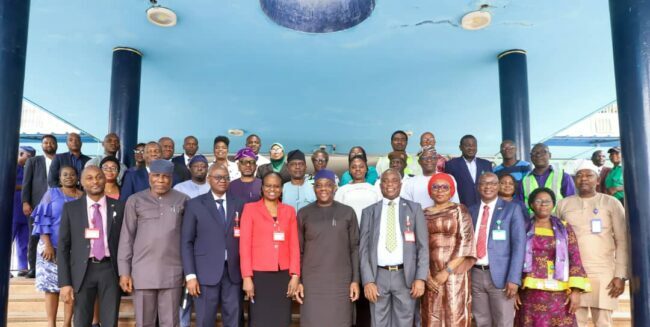The Federal Government has set up a committee to look into the issue of accumulated waiver requests for the employment of health workers in various hospitals across the country to improve healthcare delivery.
The Minister of State for Health, Dr Tunji Alausa, made this known when he paid a familiarisation visit to the University College Hospital (UCH) in Ibadan, Oyo State, as part of his ongoing over-sight function visits to assess federally owned health institutions in the country.
Alausa informed us that with the challenge of a shortage of human resources for health faced in the country, President Bola Ahmed Tinubu, GCFR, saw in his magnanimity the need for the process of waiving waivers to recruit healthcare workers to be more streamlined and simplified, and that is why the approval of the waiver request for hospitals is now domiciled at the Federal Ministry of Health.
“This is due to some bottlenecks faced by our Chief Medical and Medical Directors in the process of getting waiver approvals.
We reached out to the Head of Service of the Federation (HOSF), Dr Yemi Esan, who has been on top, working judiciously to get these approvals, but we just all decided that it will be easier if the waiver process starts with the Ministry. So going forward from January, we are setting up a waiver committee at the Ministry that will promptly review and address all waiver requests from all our hospitals.”
Alausa, who assured accountability and transparency in the process, said each hospital would generate a request for the number of staff needed from the Ministry, which will then go to the HOSF for some checks and balances under the establishment law to see what’s budgeted for the year.
“Once the Ministry confirms that everything is verified, approval for the waiver will be sent to the Budget Office, where the funds will be made available. There won’t be delays anymore, the Minister stated.
Speaking further, the Minister commended UCH for the various feats achieved in healthcare delivery, especially in the area of training, but said there is a need to train more to meet our future needs.
“Today our lifestyles have changed; the kinds of diseases we didn’t have fifty years ago we have now. With different kinds of cardiovascular diseases, we need cardiac strengthening and other forms of cardiac interventions.
“There is a need to start training more specialists in the areas of interventional cardiologist, electrophysiologist, surgical oncologist, and interventional radiologist to meet the needs of the present-day health sector.”
Dr Alausa promised to look into challenges highlighted by the college, especially in the area of power. He advised the hospital to look into other alternative power supply sources like solar, while the government will not rest on its oars in mobilising more funding to strengthen and address the issues affecting the hospital and the health sector.
Prof. Jesse Otegbayo, Chief Medical Director of UCH, highlighted some of the challenges faced as well as achievements, which include specialised surgical procedures in partnership with some UK-based charities and other organisations, as well as donations of equipment and infrastructure by well-meaning Nigerians.
He said one of the ambitions of the UCH is to move to a quaternary level of care, like some hospitals in the developed world. UCH, Ibadan, at its inception in 1948, prior to the Act of the British Parliament, had two clinical departments (Medical and Surgery) but now has 85 departments, 6 units, and 2 divisions.
